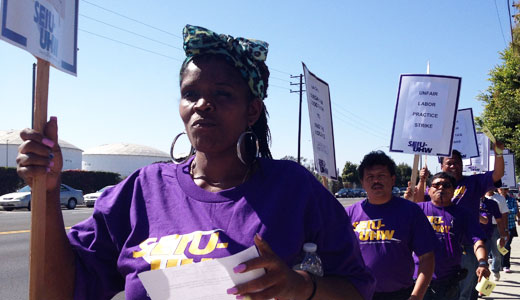
Mental health caregivers at La Casa Mental Health Rehabilitation Center in Long Beach, California went on five-day strike last week to protest unfair labor practices. The workers – mental health workers, rehabilitation counselors, licensed vocational nurses, and other skilled workers – are represented by SEIU UHW, and have been working for over a year without a contract.
La Casa is operated by Telecare Corporation, a private, for-profit company with over 60 programs in California, Nebraska, North Carolina, Oregon, Texas, and Washington. The programs focus on providing mental health services (psychiatric care, counseling, social work assistance, etc.) to people with severe mental illnesses such as bipolar disorder and schizophrenia. Services are delivered in a variety of settings, including acute and sub-acute inpatient hospitals, outpatient programs, and most recently, the company has been expanding its operations to prisons.
La Casa MHRC is one of the company’s biggest programs, with 190 beds and an income of over $18 million a year provided mainly by taxpayers via the County Department of Social Services, Social Security, Medi-Cal, and Medicare. The center is a sub-acute, locked facility for patients who have been conserved, that is, legally determined to be “gravely disabled” or “a danger to themselves or others.”
Mental health workers (MHWs) are La Casa’s direct caregivers. They help patients with daily living activities like hygiene and laundry; they also are trained to intervene in aggravated assaults and restrain violent patients. For these vitally important and at times dangerous duties, they receive a base pay of about $8 per hour. In order to improve safety and working conditions, the workers began a campaign to be represented by SEIU UHW. Despite stubborn resistance by Telecare management, including hiring high paid anti-union consultants, the overwhelming majority of workers voted for the union in February 2012.
Since that time, Telecare management stonewalled negotiations by bargaining in bad faith and committing unfair labor practices such as threatening employees with retaliation for union activities. The corporation bargained in bad faith by making dismal and insulting offers, such as a tiny 4 percent (about 32 cents an hour) raise, which was accompanied by benefit takeaways. Another offer was an unpaid day off for employees who were assaulted by patients; normally employees are granted no time off after assaults.
On the eve of the strike, management brought in a squad of uniformed security guards to “protect” the facility’s front entrance, citing rumors of employee threats of violence. Crying poverty when workers requested additional security, the management quickly found the resources to provide “defense” against their own employees, ironically the very people responsible for providing care for Telecare patients.
The main issue of the strike is the unsafe work environment at La Casa. A worker cited the company’s own statistics at a rally on the first day of the strike: “Over the past three years, there have been 640 assaults…including sexual assaults and strong arm robberies.”
Another worker recalled her own experience: “No employee should risk being assaulted on the job, yet that is the situation me and 185 other workers at La Casa face every day. Two years ago I was attacked twice in the same week by the same patient. The only thing that kept me from being injured more severely was that [another] patient stepped in to protect me.”
Long Beach City Councilmembers Patrick O’Donnell and Steve Neal also attended the rally in support of the striking workers. Expressing concern over frequent assaults and patient escapes into the surrounding community, O’Donnell said that these issues “need to be addressed in a fair and equitable contract.”
The strike placed the follow issues in sharp relief: How did we arrive at a mental health system where workers are paid poverty wages to perform vital yet hazardous services, and for-profit providers care more about the bottom line than the safety of their own employees and patients? In the eighties, the Reagan administration drove the privatization of human services as part of the effort to “shrink” government. One aspect of this effort was to cynically manipulate the desire of advocates for people with mental illness for increased freedom and normalization into support for the elimination of state-provided services. As a result, many state hospitals were downsized and shuttered, creating a huge new population of homeless people with mental illness. Private providers stepped in to fill the void left by the state, gradually replacing unionized state workers with low paid nonunion workers.
The strike at La Casa may be a harbinger of a new movement to take back human services from profit-driven corporations, putting the focus back on better care and working conditions.
Photo: Rossana Cambron

MOST POPULAR TODAY


Zionist organizations leading campaign to stop ceasefire resolutions in D.C. area

Afghanistan’s socialist years: The promising future killed off by U.S. imperialism

High Court essentially bans demonstrations, freedom of assembly in Deep South

Communist Karol Cariola elected president of Chile’s legislature






Comments